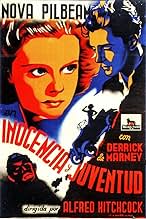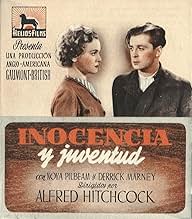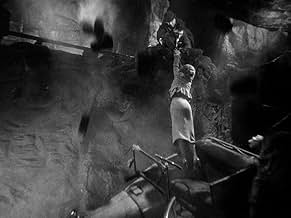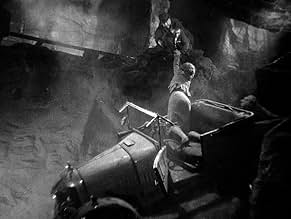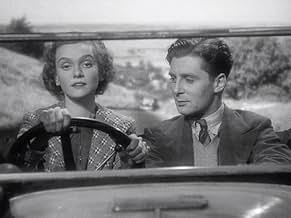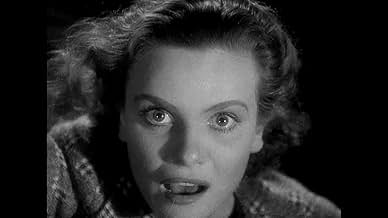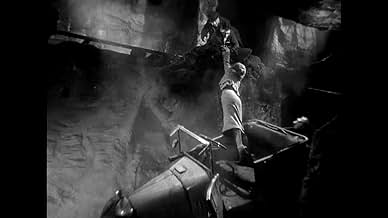IMDb-BEWERTUNG
6,8/10
11.693
IHRE BEWERTUNG
Auf der Flucht vor einer Mordanklage sichert sich ein junger Mann die Hilfe einer wunderschönen Fremden, die sich für seine Sache in Gefahr begeben muss.Auf der Flucht vor einer Mordanklage sichert sich ein junger Mann die Hilfe einer wunderschönen Fremden, die sich für seine Sache in Gefahr begeben muss.Auf der Flucht vor einer Mordanklage sichert sich ein junger Mann die Hilfe einer wunderschönen Fremden, die sich für seine Sache in Gefahr begeben muss.
- Auszeichnungen
- 1 wins total
Derrick De Marney
- Robert Tisdall
- (as Derrick de Marney)
Frank Atkinson
- Petrol Pump Attendant
- (Nicht genannt)
Clive Baxter
- Burgoyne Boy
- (Nicht genannt)
Pamela Bevan
- Little Girl at Party
- (Nicht genannt)
Ernest Borrow
- Policeman Outside Courtroom
- (Nicht genannt)
Empfohlene Bewertungen
I have always been partial to Hitchcock's British films (Murder, Blackmail, 39 Steps, et al) and I consider this one another star in the crown. Granted, it may not be as sophisticated as his later films but few films from the 30's are. It has a certain charm and suspense that will hold your interest.
This film is filled with Hitchcock's cadre of actors that he used again and again in his early films.....and what a group they are! Nova Pilbeam (The Man Who Knew Too Much) was a rather strange looking girl but is perfect for the part of the young woman who helps a stranger; Percy Marmont (Secret Agent) as her father; Mary Clare and Basil Radford (The Lady Vanishes) as the aunt and uncle; John Longden (Blackmail) in his usual role as the detective......all these players are top drawer. Derrick de Marney is rather effete as the man on the run but is very effective in the part.
Several scenes are particularly outstanding. The opening beach shots are beautifully done and the chase is on! You hold your breath in the sinking car scene even though you know that Miss Pilbeam won't be lost so early in the story, unlike Janet Leigh in Psycho. But of course, the long tracking shot in the hotel as it zooms in on the drummer man is the one that most people remember and talk about. It's dynamite.
The rural setting is delightful and Hitchcock seldom used that slice of life in his films (with the exception of The Manxman). That may be what gives the film it's more easy going pace, it's more casual feel. Regardless, Young and Innocent (which is a rather awkward title), holds up after 66 years as just another example of the artistry of the Master. Enjoy it....it's worth it.
This film is filled with Hitchcock's cadre of actors that he used again and again in his early films.....and what a group they are! Nova Pilbeam (The Man Who Knew Too Much) was a rather strange looking girl but is perfect for the part of the young woman who helps a stranger; Percy Marmont (Secret Agent) as her father; Mary Clare and Basil Radford (The Lady Vanishes) as the aunt and uncle; John Longden (Blackmail) in his usual role as the detective......all these players are top drawer. Derrick de Marney is rather effete as the man on the run but is very effective in the part.
Several scenes are particularly outstanding. The opening beach shots are beautifully done and the chase is on! You hold your breath in the sinking car scene even though you know that Miss Pilbeam won't be lost so early in the story, unlike Janet Leigh in Psycho. But of course, the long tracking shot in the hotel as it zooms in on the drummer man is the one that most people remember and talk about. It's dynamite.
The rural setting is delightful and Hitchcock seldom used that slice of life in his films (with the exception of The Manxman). That may be what gives the film it's more easy going pace, it's more casual feel. Regardless, Young and Innocent (which is a rather awkward title), holds up after 66 years as just another example of the artistry of the Master. Enjoy it....it's worth it.
This is a good Hitchcock film, but on the lighter side. The acting may be disputed (certainly many dispute about it!), but in my opinion it is a very solid, entertaining, and well-acted picture. It does have much of Hitchcock about it (not surprisingly) and is well worth watching. All of the classic Hitchcock elements are there, and they fit together wonderfully: the musical score, the camera work, the twists and turns in the plot, the thrilling scenes, the build-up, the director himself ... and not to forget the story! This is built up very carefully, and contains many, many interesting side-glances and elements. But one needs to watch the film very carefully, or more than once, in order to find these. It is indeed a sort of '39 Steps', and a precursor to several later Hitchcock films, but in its own way it occupies a place rather different than any other Hitchcock film. I am referring to a certain 'bucolic' atmosphere, which is perhaps only equalled by 'The Trouble With Harry'. The parallels to this film have perhaps not yet been adequately explored.
Another wrongfully-accused-man-on-the-run tale from Hitchcock, this time starring Derrick De Marney as a singer accused of murder. He escapes custody with hopes of clearing his name, and gets some unexpected help from Erica (Nova Pilbeam), the daughter of a police inspector. With Percy Marmont, John Longden, Edward Rigby, Mary Clare, Basil Radford, George Curzon, George Merritt, Bill Shine, and Torin Thatcher.
This was becoming well-trod territory for Hitchcock even back in '37, and De Marney & Pilbeam don't quite have the screen charisma of Donat & Carroll, but this is still enjoyable if one keeps their expectations in check. There's some miniature work featuring some trains and cars, and suspenseful mine collapse. The finale, with a band in blackface, may keep this one on the lesser-shown list. Pilbeam was 17 when this was filmed, while her romantic onscreen partner De Marney was 31.
This was becoming well-trod territory for Hitchcock even back in '37, and De Marney & Pilbeam don't quite have the screen charisma of Donat & Carroll, but this is still enjoyable if one keeps their expectations in check. There's some miniature work featuring some trains and cars, and suspenseful mine collapse. The finale, with a band in blackface, may keep this one on the lesser-shown list. Pilbeam was 17 when this was filmed, while her romantic onscreen partner De Marney was 31.
Young and Innocent (1937)
The title is appropriate to the point of being redundant, because in nearly every Alfred Hitchcock film the key theme is an innocent man accused. In this case, accused of murder, and the young man is a charming English actor, Derrick De Marney. As the police begin their hunt, he runs into the police chief's daughter, played by Nova Pilbeam, a tomboyish answer to Katherine Hepburn, and the real star of the movie.
This is a late British Hitchcock film, and it feels slightly raw around the edges, but it's so fast and likable and well constructed, you have to love it. In fact, the suspense of getting caught is balanced by some downright slapstick scenes that are brief and hilarious. And a reminder that this is a romp, the whole thing a beautiful, spritely entertainment. Never mind a killer is on the loose, because if one man is innocent of murder, another, out there somewhere, it not.
This is 1937, and by 1939 Hitchcock has moved to the U.S. to do Hollywood movies (including the amazing Rebecca in 1940), and so Young and Innocent and The Lady Vanishes (which has a similar quaint feel) wrap up his long British period. It says a lot for a movie to say I could watch it again, not because it's technically astonishing, but because it's just a joy, and very sweet. Never mind a little corniness or an inevitable ending, it's good!
The title is appropriate to the point of being redundant, because in nearly every Alfred Hitchcock film the key theme is an innocent man accused. In this case, accused of murder, and the young man is a charming English actor, Derrick De Marney. As the police begin their hunt, he runs into the police chief's daughter, played by Nova Pilbeam, a tomboyish answer to Katherine Hepburn, and the real star of the movie.
This is a late British Hitchcock film, and it feels slightly raw around the edges, but it's so fast and likable and well constructed, you have to love it. In fact, the suspense of getting caught is balanced by some downright slapstick scenes that are brief and hilarious. And a reminder that this is a romp, the whole thing a beautiful, spritely entertainment. Never mind a killer is on the loose, because if one man is innocent of murder, another, out there somewhere, it not.
This is 1937, and by 1939 Hitchcock has moved to the U.S. to do Hollywood movies (including the amazing Rebecca in 1940), and so Young and Innocent and The Lady Vanishes (which has a similar quaint feel) wrap up his long British period. It says a lot for a movie to say I could watch it again, not because it's technically astonishing, but because it's just a joy, and very sweet. Never mind a little corniness or an inevitable ending, it's good!
"Young and Innocent" is one of the best of Alfred Hitchcock's pre-Hollywood movies. It contains all of the features that characterized the finest of his British movies, and is (as many others have commented) a film often undeservedly overlooked amongst Hitchcock's large collection of classics.
The actors would all be unfamiliar to most contemporary American viewers, but it is a fine cast that does full justice to a good story, and that responds well to Hitchcock's expert direction. Derrick de Marney is engaging as the unjustly accused hero Robert Tisdall, and his character is balanced nicely by good performances from the rest of the cast (several of whom appeared in more than one of Hitchcock's British movies).
As is often the case with Hitchcock's British pictures, the title is capable of multiple interpretations. At the least, it could refer either to the hero, to the heroine, or to the overall atmosphere and themes of the movie. Young Tisdall is being chased by the law, but we know from the beginning that he is innocent, and his knowledge of that innocence enables him to remain upbeat and even playful despite the dangers and complications he faces. Erica (Nova Pilbeam), his reluctant friend and helper, is innocent in a different sense. In the story she finds her youthful naivete, especially the assumptions she has acquired in growing up as a chief police constable's daughter, challenged by the real world - perhaps for the first time in her life. Pilbeam is not a glamorous heroine (and this may be one of the reasons why "Young and Innocent" is unjustly neglected), but she was a good choice to portray the youthful earnestness and resulting moral dilemmas of her character.
Despite the film's short length, it is filled with classic Hitchcock touches of detail, artistry, and humor, many of which are more low-key than those in his more familiar Hollywood films. It is worth watching several times in order to catch and appreciate all of the details. Three sequences are especially worth noting: (i) the renowned tracking shot at the climax of the film, which is not only a fine technical achievement but also an ideal way to set up the suspenseful conclusion; (ii) the birthday party in the middle, which encapsulates in very subtle ways most of the themes and contrasts of the movie, and (iii) the sequence towards the beginning involving the hero's conference with his lawyer, his court appearance, and his escape, a sequence which is filled with comic details too numerous to catch all at once (including one of the director's most humorous cameos).
Any Hitchcock fan should thoroughly enjoy "Young and Innocent". Beyond that, any fan of thrillers who can look past an unfamiliar cast, and who is willing to look for the subtle touches that characterized the great director's British work, will also find the film a satisfying experience.
The actors would all be unfamiliar to most contemporary American viewers, but it is a fine cast that does full justice to a good story, and that responds well to Hitchcock's expert direction. Derrick de Marney is engaging as the unjustly accused hero Robert Tisdall, and his character is balanced nicely by good performances from the rest of the cast (several of whom appeared in more than one of Hitchcock's British movies).
As is often the case with Hitchcock's British pictures, the title is capable of multiple interpretations. At the least, it could refer either to the hero, to the heroine, or to the overall atmosphere and themes of the movie. Young Tisdall is being chased by the law, but we know from the beginning that he is innocent, and his knowledge of that innocence enables him to remain upbeat and even playful despite the dangers and complications he faces. Erica (Nova Pilbeam), his reluctant friend and helper, is innocent in a different sense. In the story she finds her youthful naivete, especially the assumptions she has acquired in growing up as a chief police constable's daughter, challenged by the real world - perhaps for the first time in her life. Pilbeam is not a glamorous heroine (and this may be one of the reasons why "Young and Innocent" is unjustly neglected), but she was a good choice to portray the youthful earnestness and resulting moral dilemmas of her character.
Despite the film's short length, it is filled with classic Hitchcock touches of detail, artistry, and humor, many of which are more low-key than those in his more familiar Hollywood films. It is worth watching several times in order to catch and appreciate all of the details. Three sequences are especially worth noting: (i) the renowned tracking shot at the climax of the film, which is not only a fine technical achievement but also an ideal way to set up the suspenseful conclusion; (ii) the birthday party in the middle, which encapsulates in very subtle ways most of the themes and contrasts of the movie, and (iii) the sequence towards the beginning involving the hero's conference with his lawyer, his court appearance, and his escape, a sequence which is filled with comic details too numerous to catch all at once (including one of the director's most humorous cameos).
Any Hitchcock fan should thoroughly enjoy "Young and Innocent". Beyond that, any fan of thrillers who can look past an unfamiliar cast, and who is willing to look for the subtle touches that characterized the great director's British work, will also find the film a satisfying experience.
Wusstest du schon
- WissenswertesAlfred Hitchcock: Outside the courthouse holding a camera as Robert Tisdall (Derrick De Marney) escapes (at about 0:16:10).
- Patzer(at around 50 mins) When Erica Burgoyne and Robert Tisdall have taken refuge at night in a small town by parking her car next to a siding just before where the railroad underpasses a bridge, the entire scene has been staged and shot as an obvious miniature as revealed by three mistakes:
- the somewhat jerky motion and unnatural lighting of an automobile (indicating that it was pulled) as it moves across the bridge above the railroad
- the express train speeding under the bridge drags a length of cord behind it as it disappears from view
- the camera tracking in closer to the parked automobile hidden in the shelter of freight trains on sidings reveals that the figures of Erica and Robert are actually modeled and painted figurines, motionless until the shot suddenly changes to a medium closeup shot of the two actors.
- Zitate
[last lines]
Erica Burgoyne: Father, don't you think we ought to ask Mr. Tisdall to dinner?
- VerbindungenFeatured in Reputations: Hitch: Alfred the Great (1999)
- SoundtracksNo One Can Like the Drummer Man
(uncredited)
Written by Samuel Lerner (as Lerner), Al Goodhart (as Goodhart) and Al Hoffman (as Hoffman)
Top-Auswahl
Melde dich zum Bewerten an und greife auf die Watchlist für personalisierte Empfehlungen zu.
Details
Box Office
- Weltweiter Bruttoertrag
- 401 $
- Laufzeit
- 1 Std. 20 Min.(80 min)
- Farbe
- Seitenverhältnis
- 1.37 : 1
Zu dieser Seite beitragen
Bearbeitung vorschlagen oder fehlenden Inhalt hinzufügen

